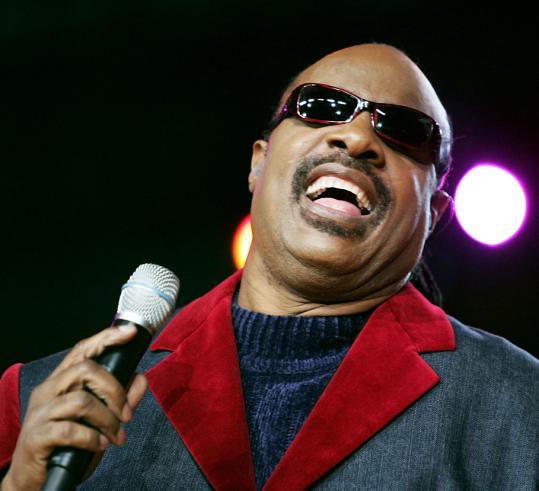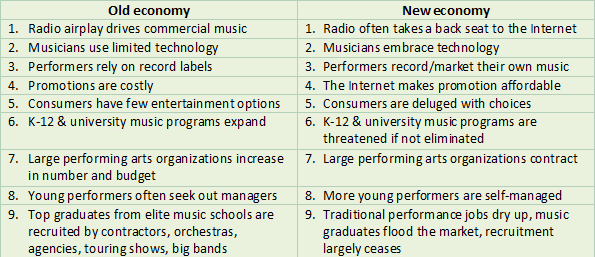
–Stevie Wonder
In Part I of this post, I claimed that industrious musicians can earn ample monetary and psychic incomes owing to the vast demand for music products and services.
But I questioned whether students typically acquire the know-how they need to attain lasting careers in the new music economy.
Here, I contrast the old and new music economies and highlight the traits of musicians who are angling for success.
The Old vs. New Music Economies

The New Music Economy Rewards Entrepreneurs
The decline of the old economy, with its lumbering institutions, has given way a new one that rewards entrepreneurial musicians.
Such nimble performers and educators enjoy having control over their art and livelihoods. They can work effectively within large organizations and also venture wherever their imaginations lead.
For instance, educators who are primed for the new economy can take conventional teaching positions, start their own music schools, or both. Performers can work for established ensembles and launch new groups.
Preparing for a Contemporary Career
From a career-preparation perspective, I propose that rising performers & educators should strive to be:
- Musical polyglots who can read music fluently, improvise, compose, and arrange (at least at a functional level), and perform more than one style
- Facile practicers and performers who learn music quickly, perform fearlessly, and work within healthy limits
- Adept collaborators who excel in both leader-run and egalitarian groups and also have elemental conducting and keyboard chops
- Tech-savvy, with the ability to administer websites, navigate Web culture, employ MIDI applications, use notation and recording software, and absorb evolving technologies
- Agile with sound reinforcement techniques as well as audio/video recording and editing
- Connected with musicians in their local communities and worldwide via the Internet
- Comfortable with business basics such as finance, contracts, negotiations, marketing, and licensing, and eager to learn fresh tactics as needed
- Competent educators who are familiar with a range of pedagogical methods and materials
- Confident communicators and arts advocates who can express themselves in writing and in front of groups, and who engage diverse constituencies in their communities
- Passionate about creativity and armed to handle the rigors of the creative process
Inclusive Skills Bring Boundless Careers
With inclusive artistic and career skills in hand, musicians can make opportunities for themselves and pounce when employment prospects arise.
For example, depending on their interests, they can perform in all sorts of venues, build a Web presence and fan base, produce recordings and tours, serve as music directors, contract other performers, create online educational products, advocate for school music programs, donate their talents to disadvantaged children, and much more.
Some people might ask, “Does the market have room for those hordes of student musicians?” Yes, but not in traditional roles. “Can students amass career skills given the time and effort involved in becoming musically proficient?” Absolutely, but schools must integrate career development into every stage of students’ educations (see my post “Music education and entrepreneurship”).
Are Music Schools and Students Up to Date?
By and large, music schools have been slow to transform their curricula. Many students, too, resist acknowledging present-day realities.
For instance, thousands of students hanker to be professional orchestra players, and universities and conservatories oblige them with fine training and fat scholarships.
Yet full-time orchestra positions are scarce, and the odds of a musician landing one border on astronomical. Not long ago, the Pittsburgh Symphony took in more than 500 applications for one flute opening. Moreover, orchestras worldwide teeter financially.
Don’t get me wrong: orchestral repertoire represents a pinnacle of human artistic achievement, so it makes sense that musicians would yearn to play such music full-time. To boot, top orchestras pay well.
But for musicians to shoot solely for orchestral careers at the expense of picking up other artistic and entrepreneurial skills seems impractical in the extreme.
That’s not to say that music students are the only ones boarding the train of impracticality.
College athletes who exclusively aim to play in the NBA or WNBA similarly ignore the odds. However, those who gear up to be comprehensive athletes who can play, teach, coach, run athletic training businesses, and so forth, are equipped to flourish in life.
K-12 educators also must keep up with the times. Beyond a flair for technology, they need to know how to promote their school programs, network in their communities, conduct new types of ensembles, and renew themselves artistically. Otherwise, they and their programs might not hold up.
Change = Opportunity
The world economy churns with change. Still, change brings opportunity. The public remains hungry for music, and there are more channels available to us than ever to satiate that hunger.
In the quotation that heads this post, Stevie Wonder reminds us that we’re responsible to use our abilities wisely. We may love and excel at music, but zeal and talent alone don’t make a career.
For music making to become our way of life we must couple our musicianship with the imagination and skills that fit the new economy.
How do we do that? In Part III, I lay out key strategies and summarize the career guidance found in my book The Musician’s Way.
© 2010 Gerald Klickstein



Thanks Michael & Angela.
Angela: I concur that it’s challenging for young musicians – who devote much of their time and mental bandwidth to practice – to acquire the inclusive skills I point to. I’m a studio teacher, so I deal with this matter first-hand. And, as you say, there’s only so much room in music curricula for projects and courses amid all of the other demands.
But what I’m suggesting is that the cultures in music schools can evolve such that students who opt to do so can have the opportunity to incrementally acquire the knowledge, skills, and attitudes necessary to align their artistic visions & skillsets with contemporary arts cultures and economies. Just as undergraduate curricula require years of music theory instruction, they can incorporate steady instruction in creative thinking, technology, collaboration, entrepreneurship, and the like.
For ex., I think we’d agree that undergraduate performance majors would do well to have insight into ways to structure concert programs. Yet many students pursue four years of music education and only put together one program – their senior recital. I think it would be advisable for students to construct many program designs during their undergraduate years for which they’d get feedback from faculty and peers (not programs that they’d perform, mind you, but ones they’d design around various ideas). Schools could even have programming competitions in which top student-designed programs win prizes or are actually performed (maybe some already do).
Fundamental proficiency in topics such as programming – which is a highly creative endeavor – can be acquired without consuming inordinate amounts of time; e.g., programming exercises could be incorporated into music history classes. Perhaps such creativity-driven, real-world curricula only suit a subset of conservatory students, but that subset isn’t being well served in most schools today. And it doesn’t help that the topic areas that constitute music curricula are commonly siloed. The courses typically aren’t designed to serve a clearly articulated, interlocking mission, despite the hifalutin language found in institutional mission statements.
Regarding business skills, I’m not suggesting that all students should, in addition to being capable artists, become wizzes at html and accounting but that students should be comfortable with web culture and the basic issues involved in managing business affairs, including, as you point out, the issue of how to get help in certain areas.
As I see it, and as I alluded to in an earlier comment, many classical musicians are ‘trained’ in an antiquated educational ‘system’ that’s meant to serve a large-ensemble industry. Given that musicians who fill roles in large ensembles have little if any responsibility for artistic, economic, and community-engagement decisions, many music school curricula similarly absolve them of thinking much about such things, to the detriment of the students’ educations.
Gerald: Thanks for this–I agree with Michael, this is terrific!
And although I very much agree with your sentiments, I want to offer some push back to further the dialogue:
When I look at the list of what we are expecting a contemporary musician to be able to do and be, I can’t help but think, it’s too much! We may need “samurai musicians” but we are dealing with actual people who need to practice 4-6 hours a day.
Perhaps through strategic partnerships, mere mortals can gather a support team or create a cooperative, in order to compensate for the skills and experience they don’t have. And in finding or creating their own niche, they can make the best use of what skills and experience they do have.
It’s also clear that musicians require far more time and experience than any degree program can provide in order to develop the range of skills necessary to sustain a career. Some of the skills need to be developed through real-life experience. But once they’re done with the degree(s) they’re often so busy paying off loans, that their fledgling entrepreneurial efforts may be sidelined or abandoned.
Have folks heard or read about Derek Sivers’ project: MuckWork (http://sivers.org/muckwork)? The idea is to be able to outsource specific parts of one’s business to leave more time for the creative work. Nice if you can afford this, but through bartering, there may be other ways to get needs met.
Thanks again, Gerald, for the thought-provoking post and your excellent work!
Excellent piece!
Bob – Thanks for the appreciative words.
It seems to me that music faculty commonly resonate with these concepts, but that music schools aren’t tackling these issues in earnest.
The inertia partially grows from the fact that music curricula typically center around large ensemble performance, which doesn’t leave much room in curricula for student-initiated projects or other avenues via which students would build up the breadth of knowledge and skills they’ll require upon graduation (esp. creative skills). To make room for such things, the emphasis on large ensemble performance would need to be reduced or at least restructured.
Ken Robinson points out that in many ways our educational institutions operate on models spawned by the industrial revolution (e.g., many music schools still function as if they’re preparing “workers” for the orchestra “industry”).
I think we urgently need another revolution in higher music education.
Gerald – Some great stuff here! Real wisdom. I’m a big proponent of BREADTH of musicianship for many reasons, including some that you’ve addressed here (and done so quite eloquently). There is no decline in the demand for music in our society and around the world. In fact, one could argue that there’s never been so MUCH music all around us. There will always be jobs for musicians. But as you point out, things are changing. I love your term “musical polyglots.” In many circles in formal music training, there’s great value placed on specialization. Perhaps this is not the best approach to take for preparing our music graduates to succeed beyond their training.
Thanks for a great post here!
Bob
Thank you, Jennifer, for the positive words about my book and site. It’s deeply gratifying to hear that you and your students are benefitting from my work.
Best wishes for 2010,
Gerald
Dear Gerald,
Thank you for your book which I have just finished ( and will continue to draw from) and required it as a reading for all my Flute Students at the University of Houston. It is a wonderful book full of positive and wonderful information. As I read your blog you continue to clearly articulate the infinite issues and ways of the musician. I hope to meet you sometime. In the meantime I would like to send you a copy of my Creative Practice Recipes, I think you would enjoy them. Please email me your school address and I will send them to you.
Thank you again for being an inspiration,
Jennifer